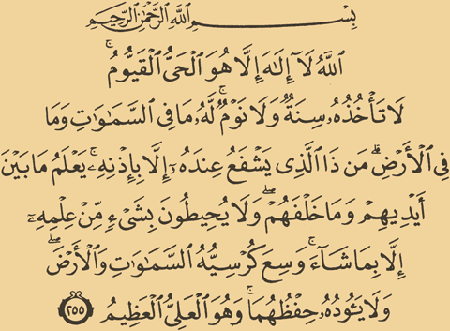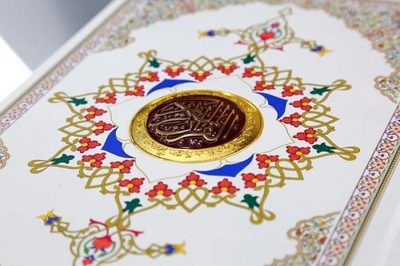Answer
Wa `alaykum As-Salamu wa Rahmatullahi wa Barakatuh
In the Name of Allah, Most Gracious, Most Merciful.
All praise and thanks are due to Allah, and peace and blessings be upon His Messenger.
In this fatwa:
1- Ayat al-Kursi It is the greatest verse in the Book of Allah
2- Whoever recites Ayat Al-Kursi immediately after each prescribed Prayer, there will be nothing standing between him and his entering Paradise except death.
3- Ayat Al-Kursi is never recited in a house but Satan leaves.
Responding to your question, Sheikh M. S. Al-Munajjid, A prominent Saudi Muslim lecturer and author, states:
The Glorious Quran is the miracle revealed by Allah to His Messenger Muhammad (peace and blessings be upon him) in the language of his people, the Arabs, who were the masters of the Arabic language.
The Quran was a challenge for them to produce the like of the shortest surah or chapter of it. Though they were the masters of eloquence and rhetoric, they failed to produce anything like it.
Muslims should recite the Quran daily. The Prophet said: “Recite the Quran for it will come as an intercessor for its reciter on the Day of Judgement.” (Muslim)
Imam Ibn Kathir (may Allah have mercy on him) said in his Tafseer of Ayat Al-Kursi:
“This is Ayat Al-Kursi, which has a high status. It was reported from the Messenger that “It is the greatest verse in the Book of Allah.”
Ubayy ibn Kaذb reported that the Prophet asked him which verse in the Book of Allah was the greatest. He said, “Allah and His Messenger know best.” He repeated it several times, then he said, “Ayat Al-Kursi.” The Prophet said, “Congratulations upon your knowledge, Abul-Mundhir. By the One in Whose hand is my soul, it has a tongue and two lips, and it glorifies the Sovereign (i.e., Allah) at the foot of the Throne.” (Abu Dawud)
Abdullah ibn Ubayy ibn Ka`b reported that his father told him that he had a vessel in which he kept dates. He used to check on it and found that the number was decreasing. So, he kept guard on it one night and saw a beast that looked like an adolescent boy. He said: I greeted him with salams and he returned my greeting, then I asked him, “What are you, a jinn or a human?” He said, “A jinn.” I said to him, “Show me your hand.” So, he showed me his hand, and it looked like a dog’s paw with dog’s fur. I said, “Do all the jinn look like this?” He said, “I know no one among the jinn who is stronger than I.” I said, “What made you do what you did [i.e., taking the dates]?” He said, “We heard that you are a man who loves charity, and we wanted to have some of your food.” Ubayy asked him, “What will protect us from you?” He said, “This verse, Ayat Al-Kursi.” Then the next day he [Ubayy] went to the Prophet and told him (about what had happened) and he said, “The evil one spoke the truth.” (At-Tirmidhi)
? Read Also: Seerah Of Prophet Muhammad – Conversions Of Omar & Hamza Plus Boycott
Imam Ahmad narrated: Muhammad ibn Jafar told us, Uthman ibn Itab told us, he said: I heard Abu As-Sulayl saying: A man from among the Companions of the Prophet addressed the people until a large number had gathered around him, then he climbed onto the roof of a house and addressed the people, saying: “The Messenger of Allah said, ‘Which verse of the Quran is the greatest?’ A man said, ‘Allah! None has the right to be worshiped but He, the Ever-Living, the One Who sustains and protects all that exists…’ [Al-Baqarah 2:255].’ He said: He put his hand between my shoulders and I felt coolness in the center of my chest, [or he said] he put his hand on the center of my chest and I felt coolness between my shoulders, and he said, ‘Congratulations on your knowledge, Abul-Mundhir.’”
Al-Bukhari narrated that Abu Hurairah said: The Messenger of Allah appointed me to guard the Ramadan Zakah. Someone came and started taking some of the food. I grabbed hold of him and said, “I am going to take you to the Messenger of Allah (peace and blessings be upon him)!” He said, “Let me be, for I am in need and I have children and I am in great need.” Som I let him go. The following morning, the Prophet said, “Abu Hurairah, what did your prisoner do last night?” I said, “Messenger of Allah, he complained of being in great need and having children to look after, so I took pity on him and let him go.” He said, “But he was lying, and he will be back.” So, I knew that he would come back, because of what the Messenger of Allah (peace and blessings be upon him) had said. I lay in wait for him, and he came and started taking some of the food. I grabbed hold of him and said, “I am going to take you to the Messenger of Allah (peace and blessings be upon him)!” He said, “Let me be, for I am in need and I have children. I will not come back again.” So, I took pity on him and let him go. The following morning, the Prophet (peace and blessings be upon him) said, “Abu Hurairah, what did your prisoner do last night?’ I said, “Messenger of Allah, he complained of being in great need and having children to look after, so I took pity on him and let him go.” He said, “But he was lying, and he will be back.” So I lay in wait for him on the third night, and he came and started taking some of the food. I grabbed hold of him and said, “I am going to take you to the Messenger of Allah (peace and blessings be upon him)! This is the third and last time. You said that you would not come back, then you did come back.” He said, “Let me go, and I will teach you some words by which Allah will benefit you.” I said, “What are they?” He said, “When you lie down in your bed, recite Ayat Al-Kursi—‘Allah! None has the right to be worshiped but He, the Ever-Living, the One Who sustains and protects all that exists…’ [Al-Baraqah 2:255] until the end of the verse, then you will have a protector from Allah and no devil will come near you until morning comes.” Then I let him go. The following morning, the Prophet (peace and blessings be upon him) said, “What did your prisoner do last night?” I said, “Messenger of Allah, he claimed that he would teach me some words by which he said Allah would benefit me, then I let him go.” He asked, “What are they?” I said, “He told me, when you lie down in your bed, recite Ayat Al-Kursi from the beginning to the end of the verse— ‘Allah! None has the right to be worshiped but He, the Ever-Living, the One Who sustains and protects all that exists…’ [Al-Baraqah 2:255]. And he told me, ‘You will have a protector from Allah and no devil will come near you until morning comes.’ The Prophet (peace and blessings be upon him) said, “He indeed told you the truth, although he is a liar. Do you know who you have been speaking with for the past three nights, Abu Hurairah?” I said, “No.” He said, “That was a devil.”
Abu Hurairah reorted that the Messenger of Allah (peace and blessings be upon him) said: “In Surat Al-Baqarah there is a verse which is the best of all the verses of the Qur’an. It is never recited in a house but Ash-Shaytan leaves: Ayat Al-Kursi.”
Concerning the fact that it includes the greatest name of Allah, Imam Ahmad said:
“Asma bint Yazeed ibn As-Sakan said: I heard the Messenger of Allah say about these two verses— “Allah! None has the right to be worshiped but He, the Ever-Living, the One Who sustains and protects all that exists…” [Al-Baraqah 2:255] and “Alif. Laam. Meem. Allah! None has the right to be worshiped but He, the Ever-Living, the One Who sustains and protects all that exists” [Aal `Imran 3:1-2]— that they contain the greatest name of Allah. (Abu Dawud and At-Tirmidhi.)”
Concerning the virtue of reciting this verse after the prescribed Prayers, Abu Umamah said: The Messenger of Allah said: “Whoever recites Ayat Al-Kursi immediately after each prescribed Prayer, there will be nothing standing between him and his entering Paradise except death.” (An-Nasa’i and Ibn Hibban)
Almighty Allah knows best.
Editor’s note: This fatwa is from Ask the Scholar’s archive and was originally published at an earlier date.
Source: www.islamqa.info


